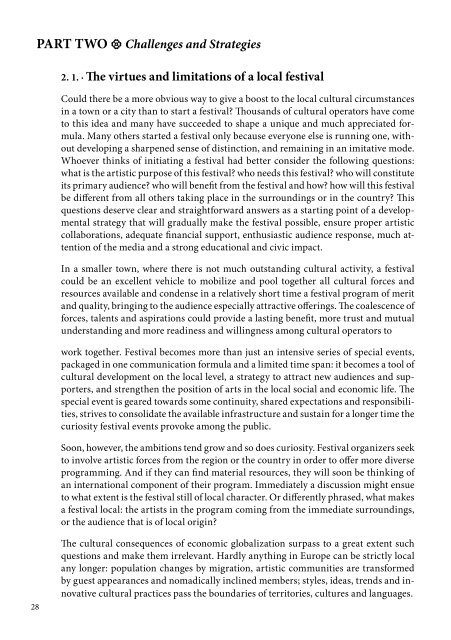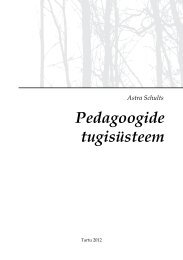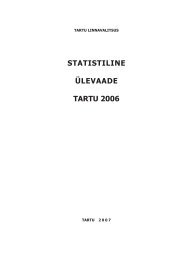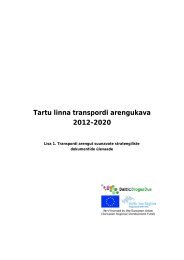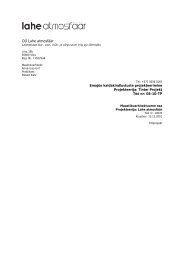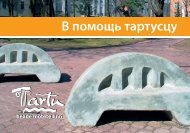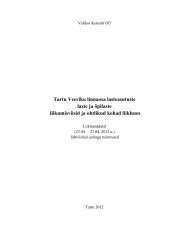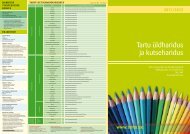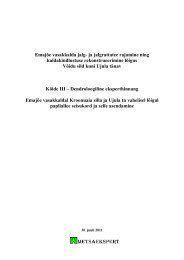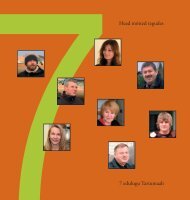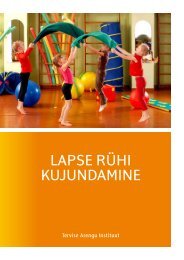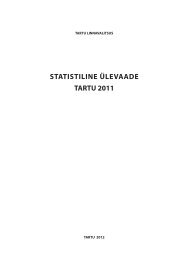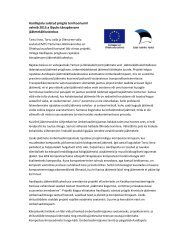Festivals - Tartu
Festivals - Tartu
Festivals - Tartu
Create successful ePaper yourself
Turn your PDF publications into a flip-book with our unique Google optimized e-Paper software.
PART TWO Challenges and Strategies<br />
2. 1. · The virtues and limitations of a local festival<br />
Could there be a more obvious way to give a boost to the local cultural circumstances<br />
in a town or a city than to start a festival? Thousands of cultural operators have come<br />
to this idea and many have succeeded to shape a unique and much appreciated formula.<br />
Many others started a festival only because everyone else is running one, without<br />
developing a sharpened sense of distinction, and remaining in an imitative mode.<br />
Whoever thinks of initiating a festival had better consider the following questions:<br />
what is the artistic purpose of this festival? who needs this festival? who will constitute<br />
its primary audience? who will benefit from the festival and how? how will this festival<br />
be different from all others taking place in the surroundings or in the country? This<br />
questions deserve clear and straightforward answers as a starting point of a developmental<br />
strategy that will gradually make the festival possible, ensure proper artistic<br />
collaborations, adequate financial support, enthusiastic audience response, much attention<br />
of the media and a strong educational and civic impact.<br />
In a smaller town, where there is not much outstanding cultural activity, a festival<br />
could be an excellent vehicle to mobilize and pool together all cultural forces and<br />
resources available and condense in a relatively short time a festival program of merit<br />
and quality, bringing to the audience especially attractive offerings. The coalescence of<br />
forces, talents and aspirations could provide a lasting benefit, more trust and mutual<br />
understanding and more readiness and willingness among cultural operators to<br />
work together. Festival becomes more than just an intensive series of special events,<br />
packaged in one communication formula and a limited time span: it becomes a tool of<br />
cultural development on the local level, a strategy to attract new audiences and supporters,<br />
and strengthen the position of arts in the local social and economic life. The<br />
special event is geared towards some continuity, shared expectations and responsibilities,<br />
strives to consolidate the available infrastructure and sustain for a longer time the<br />
curiosity festival events provoke among the public.<br />
Soon, however, the ambitions tend grow and so does curiosity. Festival organizers seek<br />
to involve artistic forces from the region or the country in order to offer more diverse<br />
programming. And if they can find material resources, they will soon be thinking of<br />
an international component of their program. Immediately a discussion might ensue<br />
to what extent is the festival still of local character. Or differently phrased, what makes<br />
a festival local: the artists in the program coming from the immediate surroundings,<br />
or the audience that is of local origin?<br />
28<br />
The cultural consequences of economic globalization surpass to a great extent such<br />
questions and make them irrelevant. Hardly anything in Europe can be strictly local<br />
any longer: population changes by migration, artistic communities are transformed<br />
by guest appearances and nomadically inclined members; styles, ideas, trends and innovative<br />
cultural practices pass the boundaries of territories, cultures and languages.


